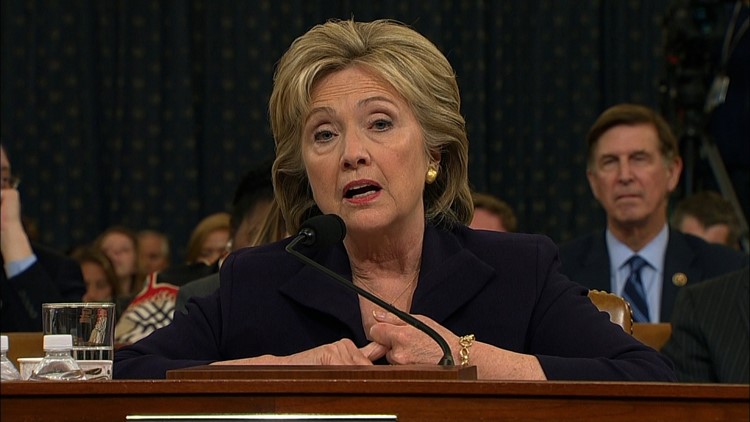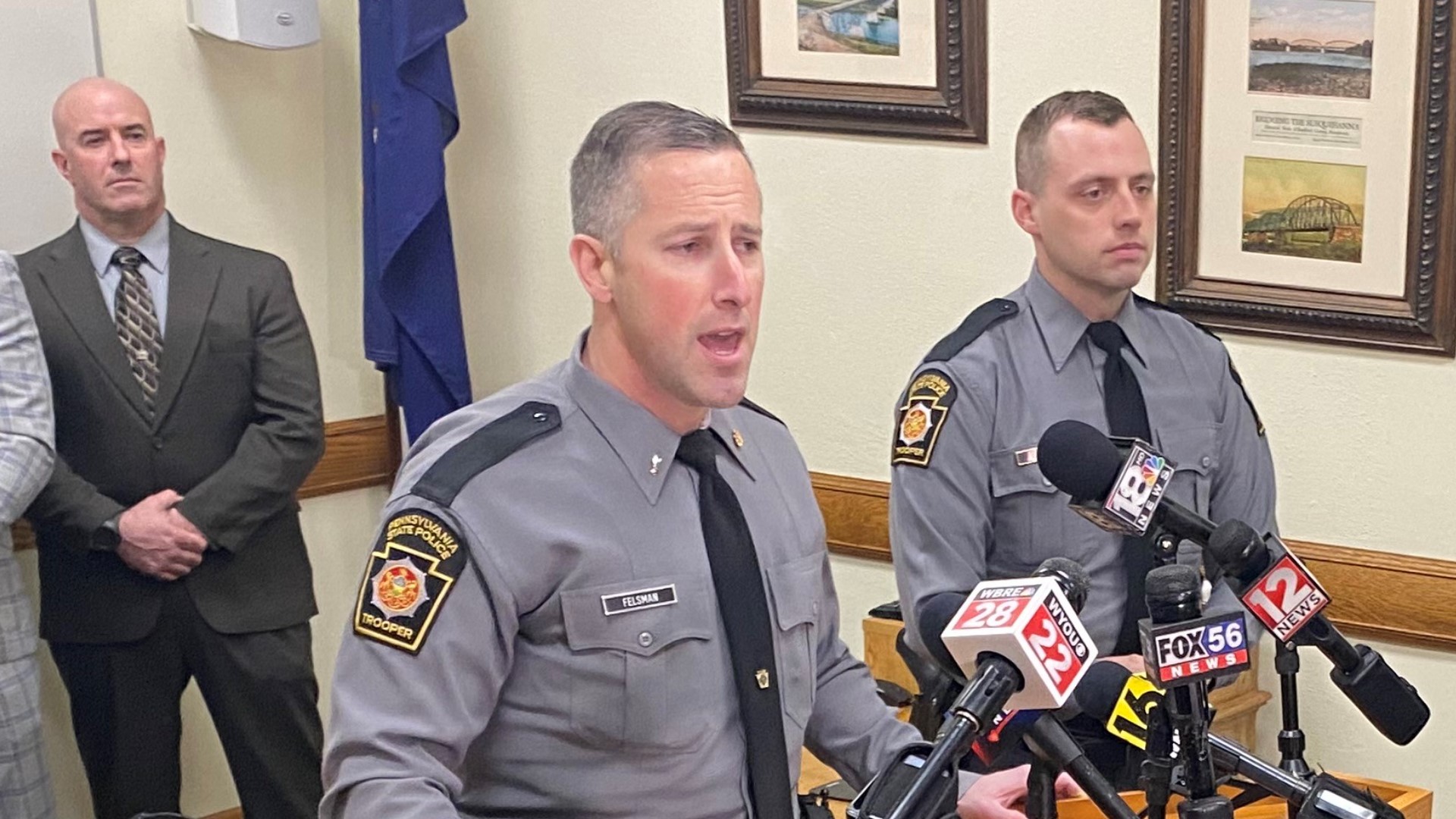WASHINGTON — The House Benghazi committee took its best swings at Hillary Clinton in a day-long hearing Thursday — but the former secretary of state remained mostly calm throughout the hearing, save for a few animated moments in which she struggled to mask her contempt for her Republican inquisitors.
The panel’s seven Republicans tried to prove Clinton ignored U.S. Ambassador to Libya Chris Stevens’ requests for additional security before the September 11, 2012, attacks during which Stevens and three other Americans were killed.
But Clinton — seeking an October trifecta after delivering a strong performance in the first Democratic presidential debate last week and then watching Vice President Joe Biden decide to sit out the race, bolstering her chances at the party’s nomination — gave them little new fodder.
Here are 11 takeaways from the hearing, one for every hour it lasted.
1. A calm and collected Clinton.
There would be no moment of exasperation like the one Clinton had made at a Benghazi hearing two years ago, when she asked of the attackers’ motives: “What difference, at this point, does it make?”
Clinton spoke slowly in a measured tone — careful to keep any anger or frustration in check even as Republicans attacked her.
She even tugged at the heartstrings of those who were watching the hearing on television, saying that insinuations that she deliberately blocked requests for increased security are “very personally painful.”
“I would imagine I’ve thought more about what happened than all of you put together. I’ve lost more sleep than all of you put together,” Clinton said.
The following morning, one source told CNN that Clinton HQ was “ecstatic.”
“That was a president sitting there,” the source, a Clinton campaign aide, said.
2. That private server.
Rep. Jim Jordan, R-Ohio, pushed Clinton hard over her use of a private email server — mocking her as “the most transparent person ever.”
He demanded to know the search terms her attorneys used to sort through which emails were work-related and therefore should be turned over to the State Department and which were personal.
“You might have made more mistakes — we don’t know,” Jordan said.
Clinton appeared a bit thrown, unable to answer questions about how, specifically, her lawyers combed through her emails.
“I have been releasing my emails to the public,” she said, a reference to the State Department’s court-ordered release of her work emails.
3. In pursuit of a ‘gotcha’ moment?
The hearing started at 10 a.m., and Jordan’s line of questioning didn’t begin until 7:45 p.m. If Republicans were hoping Clinton would be worn down, it didn’t happen. But they did manage to push the portion about Clinton’s private server into prime-time television. It was a risk, as some news outlets — like Fox News — had already cut away from the hearing.
The email questions did push Democratic Rep. Elijah Cummings over the edge, though, as he lambasted Republicans for trying to “badger you into a gotcha moment.”
“We’re better than that. We are so much better. We’re a better country,” an impassioned Cummings said to Clinton. “And we are so much better than using taxpayer dollars to try to destroy a campaign.”
4. Chats with Stevens.
Did Clinton speak with Stevens in the months before he died?
She said she couldn’t recall.
One of the most compelling — and informative — moments of the day unfolded shortly after 7 p.m. during an exchange with Rep. Susan Brooks, R-Ind., who repeatedly asked whether Clinton had spoken with Stevens after he was sworn in as the U.S. ambassador to Libya in May 2012 and before his death on Sept. 11, 2012.
“We don’t know the answer. Did you ever personally speak to him after you swore him in in May?” Brooks asked Clinton, her voice raising with emotion. “Yes or no please.”
“Yes, I believe I did,” Clinton replied. “I don’t recall.”
It was an moment that will almost certainly be referred back to again and again, particularly by critics who believe Clinton did not do enough to secure the American diplomatic mission in Benghazi. It was reminiscent of those five words that still reverberate from her 2013 testimony: “What difference does it make?”
Her voice was calm. She stood her ground. But Clinton bluntly explained that there are many diplomatic personnel working in dangerous conditions — not just Libya.
“We have diplomatic facilities in war zones,” Clinton said. “We have ambassadors that we send to places that have been bombed and attacked all the time.”
The answer wasn’t satisfactory to Brooks.
“Had you talked to him in July, he would have told you that he had asked to keep the security in Libya that he had,” Brooks said. “He was told no by your State Department.”
5. Not Gowdy’s ideal day?
Much of the focus in the lead-up to the hearing hasn’t been on Clinton at all, but on the panel’s chairman, Trey Gowdy.
The former prosecutor’s carefully laid plans for the hearing were thrown into a tailspin when Majority Leader Kevin McCarthy put Gowdy on defense by claiming the committee was scoring political points by dragging Clinton’s poll numbers down. Gowdy spent weeks trying to show that the work is only focused on getting the truth — not Clinton.
But Gowdy’s lines of questioning — hitting Clinton about her friends and her emails — will do little to erase doubts about his committee, especially as Democrats continue their threat to pull out altogether.
It’s unclear whether it sullies his future, though: Gowdy ultimately wants to leave Congress when the committee work concludes and become a federal judge, which would require a Republican in the White House.
Gowdy was unable to say what was different between Thursday’s event and the last time she testified.
“I don’t know that she testified that much differently today than the previous times she’s testified,” Gowdy told CNN.
6. Sidney Blumenthal, superstar.
The biggest player in Thursday’s hearing might not have been in the room at all.
It was Sidney Blumenthal — a long-time friend of the former secretary of state who often emailed her what Clinton has described as “unsolicited” takes on Libya and other situations, based on conversations with his own contacts.
The committee’s chairman, Gowdy, made Blumenthal the focus of the first 10-minute period in which he questioned Clinton. He highlighted negative remarks Blumenthal had made about other members of President Barack Obama’s administration.
“You know, Mr. Chairman, if you don’t have any friends who say unkind things privately, I congratulate you, but from my perspective, I don’t know what this line of questioning does to help us get to the bottom of four deaths of Americans,” Clinton said.
The committee has already interviewed Blumenthal. Democrats got frustrated enough with the GOP’s comments about him that they moved to make public the transcript of that interview — but Republicans voted down that motion.
Said Rep. Adam Schiff, D-California: “I have to say, I just don’t understand the preoccupation with Sidney Blumenthal.”
7. Schiff and the Democrats who had Clinton’s back.
Clinton had a good ally on the panel in Schiff, who is the top Democrat on the House Intelligence Committee. The closest member on the panel to classified intelligence, he gave her a lot of cover on the “fog” that happens in unfolding situations.
He also was a bit of yin to Cummings’ yang, in that his sharp attacks on his Republican colleagues have been overwhelmingly calmly delivered, while Cummings opted for more flash and bang.
Both have allowed Clinton to deliver pure, emotionally powerful statements — staying above the fray while the panel members handle throwing barbs.
Clinton had more friends in the audience. Several Democrats made appearances in the hearing room throughout the day. At one point, Clinton turned and said to them, “You’ve got my back — literally!”
8. All about the emails.
Despite Republicans’ assurances that Clinton’s use of a private email server wouldn’t be a primary focus of the hearing, the seven GOP members kept coming back to her emails.
Brooks piled two stacks of Clinton’s emails on her desk — a taller set from 2011 and a shorter collection from 2012.
Rep. Mike Pompeo, R-Kansas, asked Clinton why she had never given Stevens her personal email address.
He then pushed Clinton on whether Stevens had her home address, fax number or cell phone number, too — reminding her that her friend Blumenthal does.
Others pressed the same issue. It was part of an attempt by Republicans to demonstrate that Stevens’ requests for additional security were ignored by Clinton because she didn’t offer him enough access.
“Help us understand how Sidney Blumenthal had that kind of access to you, Madam Secretary, but the ambassador did not,” Gowdy said.
The problem for Republicans, who appeared overly focused on what has become a political hot button, is that most of the resources the committee has are in the form of emails, thousands of documents they’ve received from the State Department about what happened in Libya and Benghazi. That limits their ability to press Clinton on records obtained otherwise.
9. The Republicans refuel.
What about Thursday’s marathon hearing will give the GOP new ammunition in the fight against Clinton and her performance on Benghazi? The revelations that she told both a top Egyptian official and her own family that the attack was premeditated and, respectively, carried out by an known terror group will likely be used against her.
Jordan read out a conversation she had with then-Egyptian Prime Minister Hesham Kandil the day after the Benghazi attack in which she told him: “We know the attack in Libya had nothing to do with the film. It was a planned attack, not a protest.” And he also read from an email to her family right after the attack in which she wrote: “Two officers were killed today in Benghazi by an al Qaeda-like group.”
Clinton explained the discrepancy between those sentiments and the administration’s repeated statements in the days after the attacks that the attacks were spontaneous as largely due to fast-moving intelligence assessments in a chaotic period.
But to Republicans, they are likely to be seized on as evidence that the administration was not upfront about the nature of the attacks. Many in the GOP have long maintained that the Obama administration wanted to conceal the attacks’ ties to terrorists out of fear that would undermine a central argument in President Barack Obama’s re-election campaign — then in its closing weeks — that he had been effective in fighting terror.
10. 2012 election considerations?
Jordan submitted the former secretary of state to a dramatic period of questioning when he alleged that she and other Obama administration staff tried to blame the attack on the consulate on an anti-Muslim YouTube video to avoid undercutting Obama’s claims that he had crushed al Qaeda.
“You could live with a protest about a video, that won’t hurt you, but a terror attack would,” Jordan said, saying that Americans could accept, reluctantly, compatriots being killed abroad but “what they can’t live with is when their government is not square with them.”
Clinton rejected the claim, saying in the desperate hours after the attack that information on the true nature of the assault on the compound by a mob was unclear.
“I am sorry that it doesn’t fit your narrative, congressman,” Clinton said. “I can only tell you what the facts are.”
11. ‘I really don’t care what you say about me.’
At the end of the 11th hour — and after a brief coughing fit — Clinton could no longer hide her contempt for the Republican-led committee, and particularly Gowdy.
“I really don’t care what you say about me. It doesn’t bother me a bit,” she said while defending Admiral Michael Mullen, who helmed a previous Benghazi investigation.
She added: “I can’t help, Mr. Chairman, that you all don’t like the findings” of previous reviews.



